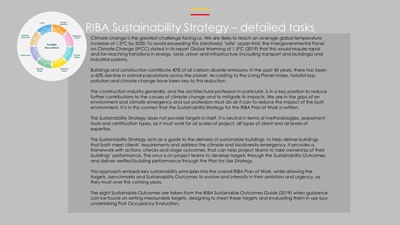
RIBA Sustainability Strategy - detailed tasks
Climate change is the greatest challenge facing us. We are likely to reach an average global temperature
increase of 1.5°C by 2030. To avoid exceeding this (relatively) 'safe' upper limit, the Intergovernmental Panel
on Climate Change (IPCC) stated in its report Global Warming of 1.5°C (2019) that this would require rapid
and far-reaching transitions in energy, land, urban and infrastructure (including transport and buildings) and
industrial systems.
Buildings and construction contribute 40% of all carbon dioxide emissions. In the past 40 years, there has been
a 60% decline in animal populations across the planet. According to the Living Planet Index, habitat loss,
pollution and climate change have been key to this reduction.
The construction industry generally, and the architectural profession in particular, is in a key position to reduce
further contributions to the causes of climate change and to mitigate its impacts. We are in the grips of an
environment and climate emergency and our profession must do all it can to reduce the impact of the built
environment. It is in this context that the Sustainability Strategy for the RIBA Plan of Work is written.
The Sustainability Strategy does not provide targets in itself. It is neutral in terms of methodologies, assessment
tools and certification types, as it must work for all scales of project, all types of client and all levels of
expertise.
The Sustainability Strategy acts as a guide to the delivery of sustainable buildings, to help deliver buildings
that both meet clients' requirements and address the climate and biodiversity emergency. It provides a
framework with actions, checks and stage outcomes, that can help project teams to take ownership of their
buildings' performance. The onus is on project teams to develop targets through the Sustainability Outcomes
and deliver verified building performance through the Plan for Use Strategy.
This approach embeds key sustainability principles into the overall RIBA Plan of Work, while allowing the
targets, benchmarks and Sustainability Outcomes to evolve and intensify in their ambition and urgency, as
they must over the coming years.
The eight Sustainable Outcomes are taken from the RIBA Sustainable Outcomes Guide (2019) when guidance
can be found on setting measurable targets, designing to meet these targets and evaluating them in use buy
undertaking Post Occupancy Evaluation.